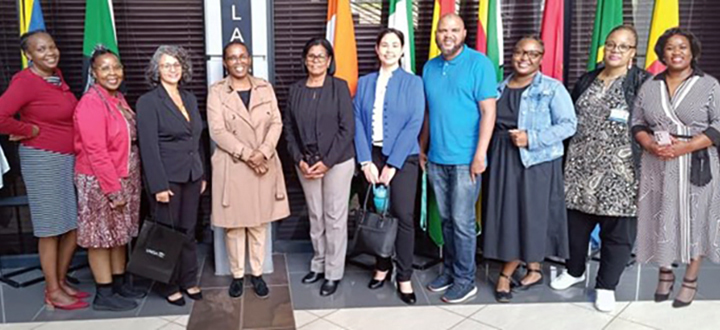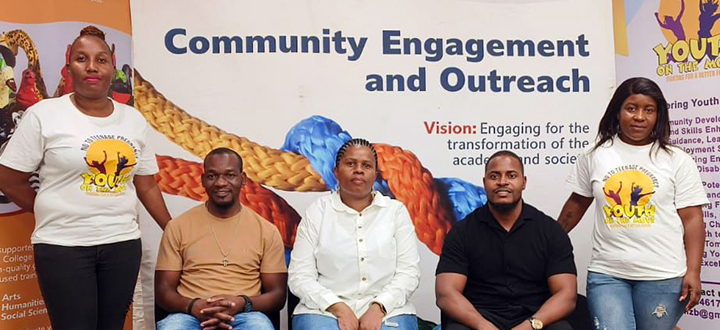Department of Science and Technology Education
My journey of exploring traditional botanical knowledge

Prof Soul Shava, Full Professor in the Department of Science and Technology Education, specialising in Environmental Education/Education for Sustainable Development
I grew up in the western part of Zimbabwe, in a city called Bulawayo. The only time I left the city was when I went to do my A levels at a boarding school, Manama High School, in Gwanda. After completing my A levels, I went to study at the University of Zimbabwe, where I studied for an Honours degree in Biological Sciences, majoring in Botany and Ecology. Upon completing my qualification, I started working as a teacher before joining the National Herbarium Botanical Garden in the early 90s as an Environmental Education Officer. My role entailed educating school learners and college and university students about the importance of plants and vegetation in the environment.
In 1995, soon after the dawn of the South African independence, I then came to South Africa to do a course in Environmental Education at Rhodes University in Grahamstown, in the Eastern Cape. After completing the course, I had an opportunity of a scholarship from the WWF-Prince Bernhard foundation from the Netherlands which focused on environmental issues. The scholarship allowed me to do my master’s degree at Rhodes University from 1999-2000. I later obtained another scholarship to pursue my Ph.D. at the same university (the VC’s doctoral research scholarship) from 2005-2009. Both my masters and Ph.D. focused mainly on ethnobotany, with a specific interested in food plants and medicinal plants. I further developed an interest in how indigenous knowledge is represented and applied in knowledge generation processes across different sectors within the society. Upon completing my Ph.D, I then had a stint in the private sector, where I was involved as Training and Development Manager for SETA learnership training on environmental practices, environmental management and water and wastewater treatment processes until I joined Unisa as a senior lecturer in Environmental Education in the Department of Science and Technology Education.
Since joining Unisa I have been promoted from being a Senior lecturer to an Associate Professor and now a Full Professor. Over and above my role in teaching and learning, I am also involved in research where I became the first chair of the Research and Innovation Committee in the department. This responsibility also included me also representing the department at College level for the same portfolio in the College Research and Innovation Committee. My main research interests are in indigenous knowledge systems and decoloniality, where I have been actively publishing research articles and book chapters. I have also been presenting at various local and international conferences, as well as presenting masters and doctoral seminars and workshops in our Department, College and the College of Graduate Studies, on various topics including the development of a research proposal, literature review, theoretical and conceptual frameworks, research theories, decolonization theories, qualitative research methods for data collection and data analysis.
My current research interests are now in Environmental Education (Education for Sustainability), Indigenous Knowledge Systems, Cultural Heritage - both tangible and non-tangible, Climate Change Education, Agrobiodiversity Conservation, traditional/Indigenous food plants, food security and food sovereignty. This has led to my recent appointment to serve as a member of the Indigenous Knowledge/ Intangible Cultural Heritage National Authentication Panel of the Department of Sports, Arts and Culture on a three-year term starting from the 1st of August 2021 to 31 July 2024. I look forward to serving on the panel, and making a difference by:
- advising and adjudicating on the authenticity of all items of South Africa’s indigenous knowledge that will be presented for inclusion onto the National Inventory.
- advising and adjudicating on elements of South Africa’s IKS that needs to be included into the National List of IKS in danger of disappearing.
- advising on urgent measures that need to be taken by the department to safeguard the IKS or ICH in danger of disappearance.
- advising the department on the candidates to be recognized as Living Human Treasures.
- advising on a process of consultations between communities and various spheres of government with regards to the promotion and protection of IKS within communities.
- advising on measures to deal with issues of sacredness and secrecy of certain elements of South Africa’s IKS or ICH.
- advising on the choice of classification structure to be used by the Department to document and store the list in the inventory of IKS or ICH.
# Moleboheng Ramulumo
Publish date: 2021-09-29 00:00:00.0

 Leading by example: Mpumalanga RSRC deputy speaker graduates
Leading by example: Mpumalanga RSRC deputy speaker graduates
 Navigating students' academic odyssey at Unisa with the Student Retention Unit
Navigating students' academic odyssey at Unisa with the Student Retention Unit
 Unisa media studies degree equips Radio Turf host to promote African discourse and decoloniality
Unisa media studies degree equips Radio Turf host to promote African discourse and decoloniality
 Rector of the University of Cienfuegos addresses Unisa conference
Rector of the University of Cienfuegos addresses Unisa conference
 SHIP continues its quest to curb teenage pregnancy
SHIP continues its quest to curb teenage pregnancy